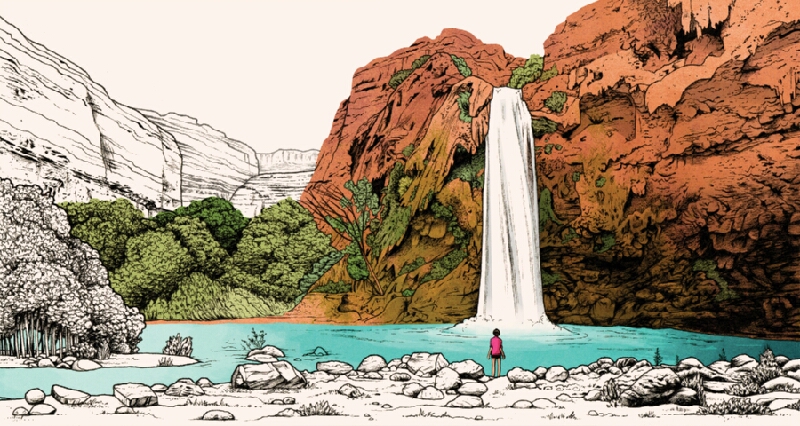Essential Faith
By Kayla Yiu
On the other side of the Grand Canyon’s southwestern border lies a reservation belonging to the Havasupai, or the People of the Blue-Green Waters. Their namesake is a nearby creek that, in reaction to limestone deposits, reflects nearly neon iridescence wherever it wades, gushes, and falls. Like its neighboring park, the reservation spans rocky cliffs and valleys and thousands of feet in elevation change—terrain so treacherous and sequestered that the people’s village, Supai, can be reached only by foot or mule. With fierce care and kindness, the Havasupai open their land to visitors—those who will respect it and those who are willing to hike 10 miles with everything they need, and nothing more, on their backs.
Backpacking through the Havasupai reservation was unforgettable because of all the things that were missing. I didn’t have even the tiniest bar of cell phone service.
Last year, I ventured there with my husband and three of our friends. On a four-day excursion, we backpacked down through the canyon, camped near the illustrious Havasu Falls, and hiked all over. It was unlike any other traveling or hiking experience I’ve had. Not because its treasures were more breathtaking (they were) or the climbing more exhilarating (it was). Backpacking through the Havasupai reservation was unforgettable because of all the things that were missing.
For starters, I didn’t have even the tiniest bar of cell phone service. Imagine not touching a phone for four days. We backpackers had no access to plumbing—only a rushing natural spring. No makeup, no shampoo, no mirrors. I had two pairs of pants: one for hiking during the day and one for sleeping. There were no mattresses, just hard-packed dirt under our backs and the rush of the creek singing us to sleep. There were no cars speeding or honking—only whispers and stirrings of other hikers. No city lights, street lights, car lights. Nothing to hide the dense layers of stars hanging above us. No work to be done, email to read, or chores. No alarm but the daily rising of the sun.
I’d sensed these absences before, but never long enough for them to matter. It was as if I’d been driving a car with bug guts and bird poop plastered on the windshield and discovered a car wash for the first time. The feeling vaguely reminded me of the time I moved into my 435-square-foot condo and purged everything but the necessities in order to make my life fit. Friends pitied my trips to donation centers and dumpsters, but each one left me a little lighter, a little cleaner.
On the reservation, I kept thinking, No wonder monks choose a stripped-down, secluded life. Without our piles of stuff, constant noise, and barrage of demands from every angle, how much clearer is their head space? Their vision? The monastic lifestyle has always seemed extreme to me, but asceticism is woven into the foundation of most forms of Christianity and other religions as well. The philosophy has withstood centuries, not because it promises to make us better people but because it’s a tried-and-true tool for keeping us—easily distracted, easily placated beings—from settling for a hazy relationship with God. The path to Him tends to become clearer the simpler our lives are. Of course, there are those who have no choice but to live with less—let’s not forget the reason the Havasupai inhabit a reservation in the first place. Yet for me, a person who has what she needs and more, that simplicity comes from paring down materials and obligations.
I think Jesus hinted at this clarity when He blessed those who are pure in heart, “for they shall see God” (Matt. 5:8). The Message translation in particular gets at the heart of ascetic living, saying, “You’re blessed when you get your inside world—your mind and heart—put right. Then you can see God in the outside world.” Isn’t that the hope? That with less clutter—whether literal or figurative—our souls might be less muddied by sin and distraction, and we’d get glimpses of God here on earth? Another translation reads, “What bliss you experience when your heart is pure! For then your eyes will open to see more and more of God” (TPT). Here it’s clear that, like the other beatitudes in Jesus’ sermon, this is not a command for us to follow. It’s an observation of how God’s creation operates, much like gravity keeping our feet on the ground. The cleaner and purer our hearts, the more we will see and know God.
As promised, the more we seek God—and perhaps make space for His presence within us—the more we find Him. So, how much do we want to see God?
Knowing all of this, it’s tempting to think we should sell all of our stuff and live in a tiny house somewhere remote. But I don’t think that’s what Jesus was getting at. The Greek word He used for “pure” in Matthew 5:8 is the same one He used when washing the disciples’ feet. After Jesus shocked His friends by performing a servant’s task, Peter accepted the gesture and asked Jesus to wash his hands and head as well. Jesus responded, “He who has bathed needs only to wash his feet, but is completely clean” (John 13:10, emphasis added). In other words, those who trust Jesus with their life will always stand in His righteousness—it cannot be dirtied. But nurturing that trust creates a meaningful relationship with Him, and it’s in our best interest to do so. In the same vein, those who believe Jesus is the Son of God are pure in heart, and God will never be completely obstructed from their sight. But as promised, the more we seek God—and perhaps make space for His presence within us—the more we find Him (Jer. 29:13). So, how much do we want to see God?
I didn’t know how much I wanted to see Him—or how cloudy my vision had become—until the backpacking trip. I can’t attest to anything concrete, but it seemed as though in a simpler, decluttered moment of life, God was a little closer. It was intoxicating enough that I began to lament hiking out of the canyon before it was even time, and I dreaded returning to cell phone tower territory.
It’s been several months since returning from Havasu Falls, and I have not adopted any ascetic practices as a result of my trip. But when I glance at my packed-out calendar or pick up my phone for the 30th time, I imagine Jesus speaking to me in the same direct, gentle tone of the beatitudes: “Blessed are the pure in heart, for they shall see God.” May I keep this truth close on days that seem utterly godless, when I doubt that He is Immanuel, God With Us. May I step outdoors when the stress of daily burdens has me disheartened—and find Him there. May we go looking for God and find Him to be lighter and freer than we could have ever imagined.
Culled from www.intouch.org

